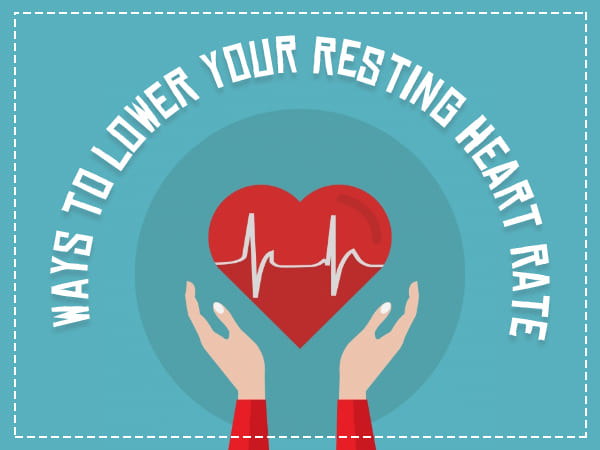Wellness
oi-Shivangi Karn
on July 6, 2020
Resting heart rate (RHR) is an important marker of your heart’s health, longevity and diseases. An individual’s RHR varies throughout the day. It is normal between 60-100 beats per minutes, faster when greater than 100 and slower when less than 60 beats per minutes.
RHR remains normal when a person is sitting or relaxing, gets slower during sleep while gets faster while performing physical activities like exercise or running. However, they return to normal after these activities, indicating good heart health.
RHR becomes a problem when it remains consistently high without any known cause. Several factors like medications, temperature, age, genetics, anxiety and panic attack cause elevated levels of RHR, leading a person to cardiovascular diseases such as stroke or heart failure. Take a look at a few effective ways to lower your RHR.
 20 Home Remedies To Treat Nerve Weakness
20 Home Remedies To Treat Nerve Weakness

1. Exercise
Regular exercise or sports cause a lot of impact on reducing RHR. In a study, it was found that all types of sports, especially endurance training and yoga plays an important role in significantly decreasing RHR in both males and females. This is positively related to good health condition and reduction in mortality due to cardiovascular diseases. [1]

2. Lower Your Stress
Though the direct link between stress and cardio health is still controversial, many theories and analysis suggest that stress or any stressful events in the past can increase RHR and cause heart problems. Focus on ways to calm the mind and lower stress levels. The best way is to get engaged in art, recreational or pet therapy as they help in shifting your mind from stress to productive stuff. [2]

3. Avoid Tobacco And Alcohol Products
A study shows that smokers have higher RHR compared to non-smokers. [3] Smoking affects a person’s health in many ways, including the risk of developing coronary diseases. Tobacco or alcohol narrows the veins and arteries, making the heart work harder to pump blood, causing increased RHR. Restrict the use of alcohol and tobacco to lower your RHR.
READ RELATED: 12 symptoms found to strike exactly 1 month before a heart attack – seen in 71% of cases

4. Stay Away From Heat
Increased RHR is one of the important factors responsible for heart diseases and death. A study shows that high temperature can cause a short-term impact on the heart. Therefore, it is recommended to stay away from hot temperature areas or extreme heat to lower RHR and prevent the risk of heart diseases and related mortality. [4]

5. Include Omega-3 Fatty Acids In Diet
Omega-3 fatty acids’ effect on lowering RHR was observed in many studies among people with or without heart-related diseases. Consumption of fish oil or dietary fish rich in fatty acids significantly reduces RHR, thus preventing cardiovascular diseases. Omega-3 fatty acids lower RHR irrespective of the relative fitness of an individual, suggesting its high efficacy on the heart rate. [5]

6. Perform Deep Breathing Exercises
Deep breathing exercises (DBE) show improved cardiovascular functions. Pranayama or anuloma-viloma, a major DBE slow heart rate even within a week of regular practice. Pranayama is considered an ancient technique that improves parasympathetic tone and reduces sympathetic activity hence, improving the overall heart health. [6]

7. Lose Weight
Good physical fitness is directly related to low RHR. Excess body fat releases inflammatory adipokines that increase nervous system activity and cause RHR to spike up. Make efforts to lose weight by doing regular exercises or other physical activities such as running or swimming to lower your RHR. [7]

8. Take A Warm Relaxing Bath
A study talks about the link between hot water bathing and heart diseases. Taking a sauna bath or warm bath at least five times a week, have shown a significant decrease in RHR by causing a favourable effect on central haemodynamic and atherosclerotic parameters (blood flow in the heart). [8]

9. Stay Hydrated
Hypohydration or loss of water in the body may have some negative effects on heart health. Acute hypohydration can increase the future risk of heart-related diseases by impairing vascular functions and reducing endothelial activity (cells that control vascular relaxation and contraction). It is recommended to drink around one to two litres of water a day. [9]

10. Cut Down On Caffeine
Caffeine or caffeinated drinks have a diuretic property that causes frequent urination and leads to dehydration. Due to the loss of water in the body, the blood circulation may decrease and cause the heart to pump more. This may lead to heart-related diseases. Therefore, it is suggested to cut down on caffeine drinks or coffee.

11. Eat A Balanced Diet
Eating a well-balanced diet consisting of fruits, vegetables and dried fruits help to improve heart health. A study suggests that consuming meals rich in all nutrients like proteins, vitamins, minerals, carbohydrates and fats shows a significant change in lowering RHR. [11]
GET THE BEST BOLDSKY STORIES!
Allow Notifications
You have already subscribed
Source: boldsky blog




 25 Food To Eat When You Have Food Poisoning
25 Food To Eat When You Have Food Poisoning How To Treat Intertrigo: Safe And Effective Home Remedies
How To Treat Intertrigo: Safe And Effective Home Remedies
















